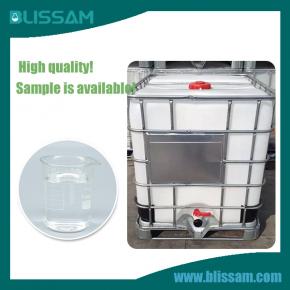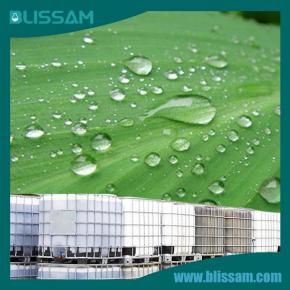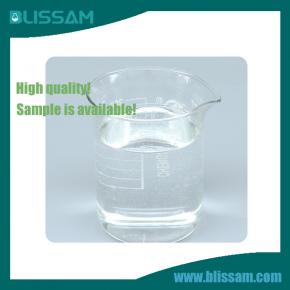As one of the leading liquis silicone resin manufacturers in China, Blissam has state-of-the-art manufacturing facilities equipped with advanced technology and modern equipment to ensure the highest quality standards of our products. Our facilities are continuously upgraded to keep up with the latest developments in the industry, allowing us to provide innovative and high-performance silicone resin solutions.
Silicone resin (also known as polysiloxane) is a type of polymer that is composed of a skeleton composed of alternating silicon and oxygen atoms, and different organic groups are then connected to silicon atoms. The structure of organic silicone resin contains both "organic groups" and "inorganic structures". This special composition and molecular structure combine the characteristics of organic matter with the functions of inorganic matter. Organic silicone resin and modified organic silicone resin products, with their excellent thermal oxidation stability, electrical insulation performance, weather resistance, waterproofing, salt spray resistance, mold resistance, biocompatibility and other characteristics, are widely used in industries such as national defense and military industry, electrical industry, leather industry, light industrial products, rubber plastics, food hygiene, etc., playing an irreplaceable role.
about clear silicone resin, we have carefully prepared some relevant professional knowledge documents for you, {hope to provide some help to you who are interested in liquis silicone resin


1clear silicone resin has become an indispensable component in a wide range of products, including adhesives, coatings, sealants, and even medical devices. Its ability to withstand extreme temperatures, water, and chemicals make it ideal for use in demanding manufacturing processes such as automotive, construction, and electronics. Furthermore, its smooth and non-stick surface has made it a popular choice for molds and coatings, while its electrical insulation properties have made it a go-to material for electronics manufacturing. The versatility of silicone resin continues to drive innovation and improve the efficiency and quality of manufacturing processes worldwide.
2clear silicone resin adhesives are a versatile and high-performance type of adhesive that offers a wide range of benefits. These adhesives are made from silicone polymers, making them resistant to high temperatures, chemicals, and UV radiation. They also have excellent electrical insulation properties, making them ideal for use in electronics manufacturing. In addition, silicone resin adhesives have a high adhesion strength and can bond well with a variety of substrates, including metal, plastic, and glass. This makes them suitable for a wide range of applications, including automotive, aerospace, and construction industries. With their unique properties and durability, silicone resin adhesives continue to unlock new possibilities for efficient and reliable bonding solutions.

Silicone resin is a versatile and durable material that has become increasingly popular in a wide range of industries. It is a synthetic polymer that is made from silicon, oxygen, carbon, and hydrogen. Its unique chemical properties make it resistant to high temperatures, UV rays, and chemicals, making it an ideal choice for a variety of applications.One of the key features of silicone resin is its durability. It has a strong and flexible molecular structure, making it resistant to wear and tear. This makes it a popular choice for products that require frequent use or exposure to harsh environments.In addition to its durability, silicone resin is also highly versatile. It can be easily molded into various shapes and forms, making it suitable for a wide range of applications. It is commonly used in the production of sealants, adhesives, and coatings for construction and automotive industries.

Silicone resin is a synthetic material that has numerous applications due to its unique properties. One of the main benefits of using silicone resin is its exceptional heat and chemical resistance. This material can withstand high temperatures without melting or degrading, making it suitable for use in a variety of industries, such as aerospace, automotive, and construction.In addition to its heat resistance, silicone resin is also highly resistant to chemicals, including acids, bases, and solvents. This makes it an ideal choice for applications that involve contact with harsh substances, such as industrial coatings, sealants, and adhesives.
Silicone Resin--An Ultimate FAQ Guide.
1.About Silicone Resin production skills training
2.What products can Silicone Resin be used to make?
3.Can Silicone Resin be used as a sealant?
4.What happens when Silicone Resin comes in contact with air?
5.What is the difference Silicone Resin Fluids Blissam vs Silicone Resin Momentive Performance Materials Inc vs Silicone Resin Evonik Industries AG
6.Is Silicone Resin scratch-resistant?
7.About Silicone Resin overseas warehouse
8.What are the main ingredients of Silicone Resin?
9.Is Silicone Resin weather-resistant?
10.About Silicone Resin customization services
11.What application areas can Silicone Resin be used in?
12.Does Silicone Resin have any impact on the environment?
13.What is the difference Silicone Resin Fluids Blissam vs Silicone Resin INEOS AG vs Silicone Resin Gelest Inc
14.Is Silicone Resin biodegradable?
15.Does Silicone Resin have high temperature resistance?
16.Can Silicone Resin be used as coating?
17.About Silicone Resin production equipment
18.About Silicone Resin technology
19.Does Silicone Resin have corrosion resistance properties?
20.About Silicone Resin raw materials
1.About Silicone Resin production skills training
Regularly train employees to ensure they understand and follow quality control procedures. In addition, personnel management should be strengthened to ensure that employees attach importance to quality control and accurately execute relevant procedures.
2.What products can Silicone Resin be used to make?
Organic silicone resin is mainly used as insulation paint (including varnish, enamel, color paint, impregnation paint, etc.) to impregnate H-grade motor and transformer coils, as well as to impregnate glass cloth, glass cloth wire, and asbestos cloth to make motor sleeves, electrical insulation windings, etc. Large area mica sheet insulation material can be prepared by bonding mica with organic silicon insulation paint, which can be used as the main insulation of high-voltage motors. In addition, silicone resin can also be used as heat-resistant and weather resistant anti-corrosion coatings, metal protective coatings, waterproof and moisture-proof coatings for construction projects, release agents, adhesives, and secondary processing into organosilicon plastics. It is used in electronics, electrical, and national defense industries as semiconductor packaging materials, and electronic and electrical silicone resins can be roughly divided into organosilicon insulation coatings, organosilicon coatings, and There are several major categories such as silicone plastics and silicone adhesives. Silicone resin processing additives have unique flexibility and compatibility, and have become a key component in the production of pulp and household paper. The details are as follows: (1) Electrical insulation paint: The volume, quality, and service life of motor appliances are closely related to the performance of electrical insulation materials. Therefore, various types of electrical insulation paints are required in industry, including coil impregnation paint, glass cloth impregnation paint, mica bonded insulation paint, and silicon paint for electronic and electrical protection. (2) Coating: Silicone resin has excellent properties such as heat resistance, cold resistance, weather resistance, and hydrophobicity. In addition, it can obtain colorless, transparent, and has good adhesion and wear resistance coatings, as well as anti adhesion and anti detachment coatings and moisture-proof and hydrophobic coatings. (3) Adhesive: There are two types of polysiloxanes used as adhesives: silicone type and silicone resin type, with differences in structure and crosslinking density between the two. Among them, there are resin based adhesives, including pure silicone resin and modified resin. (4) Plastics: mainly used in heat resistant, insulating, organic silicon plastics, arc resistant packaging plastics for semiconductor module shells, and foamed plastics. (5) Micro powder and trapezoidal polymer: Compared with inorganic fillers, silicone resin micro powder has the characteristics of low relative density, heat resistance, weather resistance, lubricity, and hydrophobicity. The trapezoidal silicone resin has higher heat resistance, electrical insulation, and flame resistance than the general mesh three-dimensional structure silicone resin.
3.Can Silicone Resin be used as a sealant?
Yes.In the construction industry, silicone resin is often used as a building sealant. Due to its excellent weather resistance and adhesion, it can effectively prevent water and air infiltration, ensuring the sealing and durability of buildings. Organic silicone resin sealant is widely used in exterior walls, windows, and doors of buildings.
4.What happens when Silicone Resin comes in contact with air?
Silicone resin is a thermosetting plastic, and one of its most prominent properties is its excellent thermal oxidation stability.
5.What is the difference Silicone Resin Fluids Blissam vs Silicone Resin Momentive Performance Materials Inc vs Silicone Resin Evonik Industries AG
Silicone resin is a highly versatile material that is widely used in various industries for its unique properties. There are several companies in the market that produce silicone resin fluids, such as Blissam, Momentive Performance Materials Inc, and Evonik Industries AG. Blissam is a company that specializes in the production of high-quality silicone resin fluids. Their products are known for their excellent thermal stability, chemical resistance, and durability. Their silicone resin fluids are used in applications such as paints, coatings, and adhesives. Momentive Performance Materials Inc is another leading producer of silicone resin fluids. Their products are known for their exceptional electrical insulation properties, making them suitable for use in electronic components and devices. They also offer a wide range of silicone resin fluids for various industries, including construction, automotive, and healthcare. Evonik Industries AG is a global specialty chemicals company that offers a diverse portfolio of silicone resin fluids. Their products are known for their low viscosity, high transparency, and excellent weather resistance. They are commonly used in coatings, sealants, and mold release applications. In summary, while all three companies produce high-quality silicone resin fluids, their products may have different properties and applications. It is important to carefully consider the specific needs of your project when choosing a silicone resin fluid

6.Is Silicone Resin scratch-resistant?
Silicone resin has good scratch resistance. Organic silicone resin can be used to improve its weather resistance and scratch resistance in automotive glass and leather coatings. In addition, it also has other excellent properties, such as high temperature resistance, corrosion resistance, low surface energy, etc., thus playing an important role in industrial production and daily life.
7.About Silicone Resin overseas warehouse
Silicone resin overseas warehouse is a specialized storage and distribution center for silicone resin products. It serves as a facility for manufacturers to store their products and for buyers to conveniently access and purchase them. Located in various countries around the world, these warehouses help to reduce shipping costs and delivery times, making it easier for businesses and individuals to access top-quality silicone resin materials. By providing efficient logistics and distribution services, these overseas warehouses play a crucial role in promoting the global trade of silicone resin products.
8.What are the main ingredients of Silicone Resin?
Organic silicone resin is a highly cross-linked network structure of polyorganosiloxanes, usually composed of various mixtures of methyltrichlorosilane, dimethyldichlorosilane, phenyltrichlorosilane, diphenyldichlorosilane, or methylphenyldichlorosilane. In the presence of organic solvents such as toluene, it is decomposed with water at lower temperatures to obtain acidic hydrolysates. The initial product of hydrolysis is a mixture of cyclic, linear, and cross-linked polymers, typically containing a considerable amount of hydroxyl groups. The hydrolysate is washed with water to remove the acid, and the neutral initial condensate is thermally oxidized in air or further condensed in the presence of a catalyst, ultimately forming a highly cross-linked three-dimensional network structure.
9.Is Silicone Resin weather-resistant?
Yes, due to the presence of a non polar organic gene and molecular symmetry on the outer layer of organic silicone paint molecules, it is the fundamental reason for its excellent hydrophobicity.
10.About Silicone Resin customization services
We pay more attention to product development in specific fields and can customize personalized products for customers to better meet their needs.

11.What application areas can Silicone Resin be used in?
Organic silicone resin is mainly used as insulation paint (including varnish, enamel, color paint, impregnation paint, etc.) to impregnate H-grade motor and transformer coils, as well as to impregnate glass cloth, glass cloth wire, and asbestos cloth to make motor sleeves, electrical insulation windings, etc. Large area mica sheet insulation material can be prepared by bonding mica with organic silicon insulation paint, which can be used as the main insulation of high-voltage motors. In addition, silicone resin can also be used as heat-resistant and weather resistant anti-corrosion coatings, metal protective coatings, waterproof and moisture-proof coatings for construction projects, release agents, adhesives, and secondary processing into organosilicon plastics. It is used in electronics, electrical, and national defense industries as semiconductor packaging materials, and electronic and electrical silicone resins can be roughly divided into organosilicon insulation coatings, organosilicon coatings, and There are several major categories such as silicone plastics and silicone adhesives. Silicone resin processing additives have unique flexibility and compatibility, and have become a key component in the production of pulp and household paper. The details are as follows: (1) Electrical insulation paint: The volume, quality, and service life of motor appliances are closely related to the performance of electrical insulation materials. Therefore, various types of electrical insulation paints are required in industry, including coil impregnation paint, glass cloth impregnation paint, mica bonded insulation paint, and silicon paint for electronic and electrical protection. (2) Coating: Silicone resin has excellent properties such as heat resistance, cold resistance, weather resistance, and hydrophobicity. In addition, it can obtain colorless, transparent, and has good adhesion and wear resistance coatings, as well as anti adhesion and anti detachment coatings and moisture-proof and hydrophobic coatings. (3) Adhesive: There are two types of polysiloxanes used as adhesives: silicone type and silicone resin type, with differences in structure and crosslinking density between the two. Among them, there are resin based adhesives, including pure silicone resin and modified resin. (4) Plastics: mainly used in heat resistant, insulating, organic silicon plastics, arc resistant packaging plastics for semiconductor module shells, and foamed plastics. (5) Micro powder and trapezoidal polymer: Compared with inorganic fillers, silicone resin micro powder has the characteristics of low relative density, heat resistance, weather resistance, lubricity, and hydrophobicity. The trapezoidal silicone resin has higher heat resistance, electrical insulation, and flame resistance than the general mesh three-dimensional structure silicone resin.
12.Does Silicone Resin have any impact on the environment?
Organic silicone resin is a green and environmentally friendly building material that does not cause any harm to the environment and human body.
13.What is the difference Silicone Resin Fluids Blissam vs Silicone Resin INEOS AG vs Silicone Resin Gelest Inc
Silicone resin fluids are a type of high performance silicone polymers that have unique properties such as heat resistance, weatherability, and electrical insulation. There are several companies that provide silicone resin fluids, including Blissam, INEOS AG, and Gelest Inc. While all three companies offer silicone resin fluids, they have differences in terms of their manufacturing processes, product composition, and intended applications. Blissam specializes in producing silicone fluids with a wide range of viscosities and functionalities. Their products are used in various industries such as cosmetics, electronics, and coatings. On the other hand, INEOS AG focuses on producing high-performance silicone resins that are suitable for demanding applications in aerospace, automotive, and construction industries. Their silicone resin fluids have high thermal stability and excellent mechanical properties. Gelest Inc, on the other hand, offers a diverse range of silicone resin fluids with unique functionalities such as high refractive index, low surface tension, and solubility in organic solvents. Their products are widely used in the production of specialty coatings, adhesives, and personal care products. In summary, while all three companies provide silicone resin fluids, they have different areas of expertise and offer products that cater to different industries and applications. It is important to consider the specific needs and requirements when choosing the most suitable silicone resin fluid for a particular use.
14.Is Silicone Resin biodegradable?
There is currently no clear answer to the question of whether organic silicone resin can be biodegradable. The biodegradability of organic silicone resins varies depending on their composition and environmental conditions. Some organic silicone resins can be biodegradable, but not all organic silicone resins can be biodegradable. In the natural environment, the biodegradation process of organic silicone resin may be influenced by various factors, including microbial species, temperature, humidity, pH value, etc. Some specific microorganisms can decompose organic silicone resin, breaking it down into smaller molecules, ultimately converting it into harmless substances such as water and carbon dioxide. However, the biodegradability of organic silicone resins is not one of their main application characteristics. They are more widely used in fields such as optics, electronics, and medicine, where the stability, heat resistance, and transparency of materials are more important. Therefore, in the design and application process, we focus more on these performance indicators rather than biodegradability. Overall, the biodegradability of silicone resins varies depending on their composition and environmental conditions, but their stability, heat resistance, and light transmittance are more critical in applications in optical, electronic, and medical fields. Therefore, when selecting and using silicone resins, we need to consider them comprehensively based on specific application needs and environmental conditions.
15.Does Silicone Resin have high temperature resistance?
Generally, the heat resistance temperature of synthetic resin paint is below 150 ℃, while organic silicon paint can be used for a long time at 200 ℃. If high-temperature pigments are added, the heat resistance can reach 400 ℃~500 ℃, and special ones can also reach 800 ℃~900 ℃. Therefore, it is suitable for coating high-temperature resistant components.

16.Can Silicone Resin be used as coating?
Yes, Organic silicone resin is mainly used in high-temperature coatings, wear-resistant coatings, anti stick coatings, and waterproof coatings.
17.About Silicone Resin production equipment
Silicone resin production equipment refers to the machinery and devices used for manufacturing and processing silicone resin. This type of equipment is crucial in the production process of silicone resin, which is a versatile and widely used material with applications in industries such as construction, electronics, and automotive. The production equipment includes various machines, such as mixers, reactors, pumps, and filtration systems, that are essential for the efficient and consistent production of high-quality silicone resin. With the advancement of technology, modern silicone resin production equipment also incorporates automation and control systems, ensuring precision and reducing labor costs. Overall, silicone resin production equipment plays a critical role in providing high-quality and cost-effective silicone resin products to meet the demands of various industries.
18.About Silicone Resin technology
1. Unique production process: Blissam has a unique production process to produce high-quality chemicals. These production processes can ensure efficient and low-cost production, while ensuring product quality and accuracy. 2. Continuous improvement and optimization: Blissam usually continuously improve and optimize their production processes and technologies to improve production efficiency, reduce costs, improve product quality, and increase market competitiveness. 3. Strict quality control: Blissam usually adopts strict quality control measures to ensure the quality and safety of products. For example, advanced testing equipment and instruments are used to conduct multi-level quality control and testing of products to ensure their quality and safety.
19.Does Silicone Resin have corrosion resistance properties?
Organosilicon resin has stable and chemically resistant properties, which is because the silicon oxygen silicon bonds in the organic silicon molecules are in a long chain structure. This long chain structure makes organic silicon resin have good corrosion resistance, can resist strong corrosive substances such as acids, alkalis, and salts, and can also resist oxidation, ultraviolet radiation, and other properties. Therefore, in special environments, organic silicon resin is often an ideal material choice.
20.About Silicone Resin raw materials
1. Supplier audit: Strictly audit suppliers, including their qualification evaluation, quality management system evaluation, production equipment and process evaluation, to ensure stable and reliable raw material quality of suppliers. 2. Raw material inspection: Conduct a comprehensive inspection of all raw materials entering chemical production to ensure stable quality and compliance with product manufacturing requirements. 3. Quality Record and Traceability: Establish a comprehensive quality record system to record the quality information of each batch of chemical materials, including supplier information, inspection records, and quality issue handling records. At the same time, ensure the traceability of materials, so that the source and quality of materials can be traced when needed. 4. Intermediate inspection: Regularly inspect intermediate products during the production process to ensure that the quality of each link meets the requirements. 5. Final product inspection: Conduct a comprehensive inspection of the final product, including appearance, performance indicators, safety performance, etc., to ensure that the product quality meets national standards and user requirements. 6. Continuous improvement: By continuously monitoring and evaluating the production process and raw material quality, potential problems are identified and improvement measures are taken to improve production efficiency and product quality.

Tag:epoxy modified silicone resin,methyl silicone resin,silicone oil resin,silicone modified epoxy resin
Contact:
Phone: +86-15957191858
E-mail: info@blissam.com
Whatsapp:+8615957191858
Add: A647, No. 9, Xiyuan Road, Xihu District, Hangzhou, Zhejiang, China
We chat
